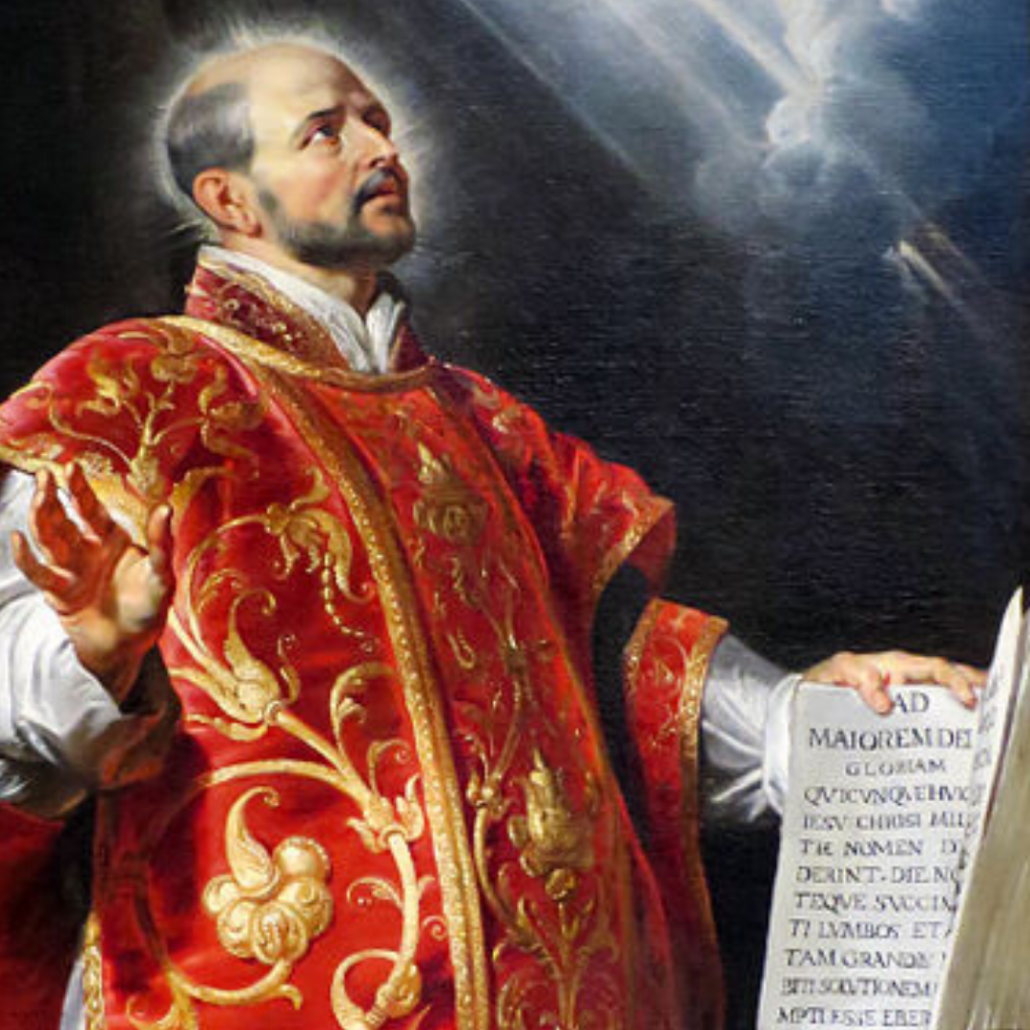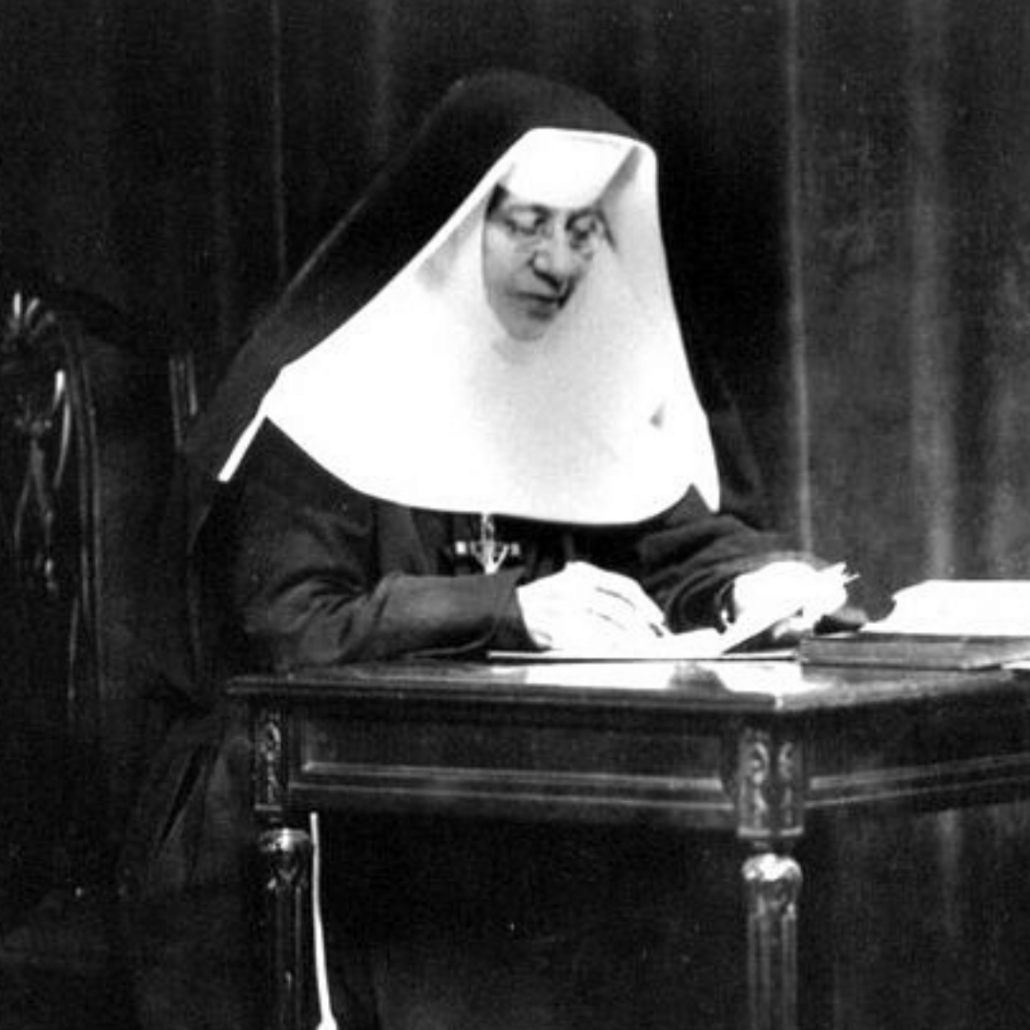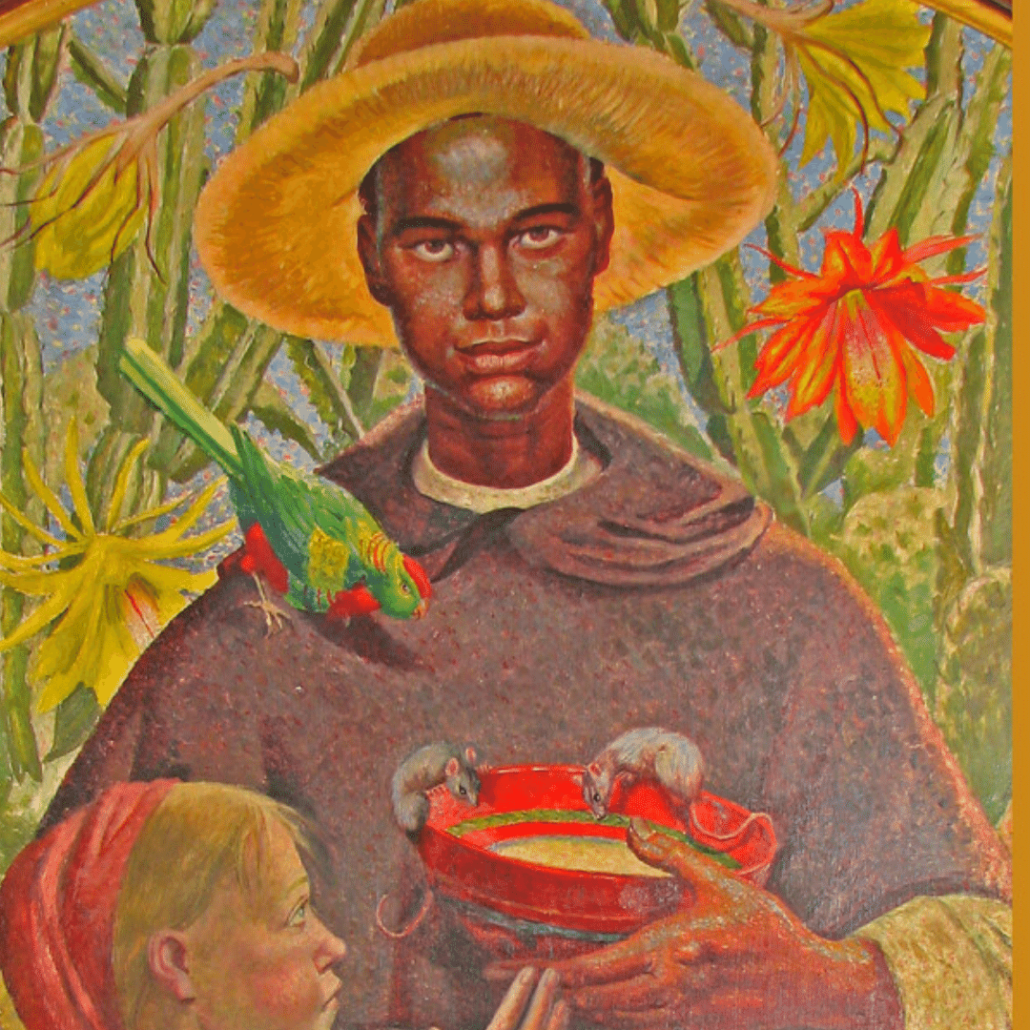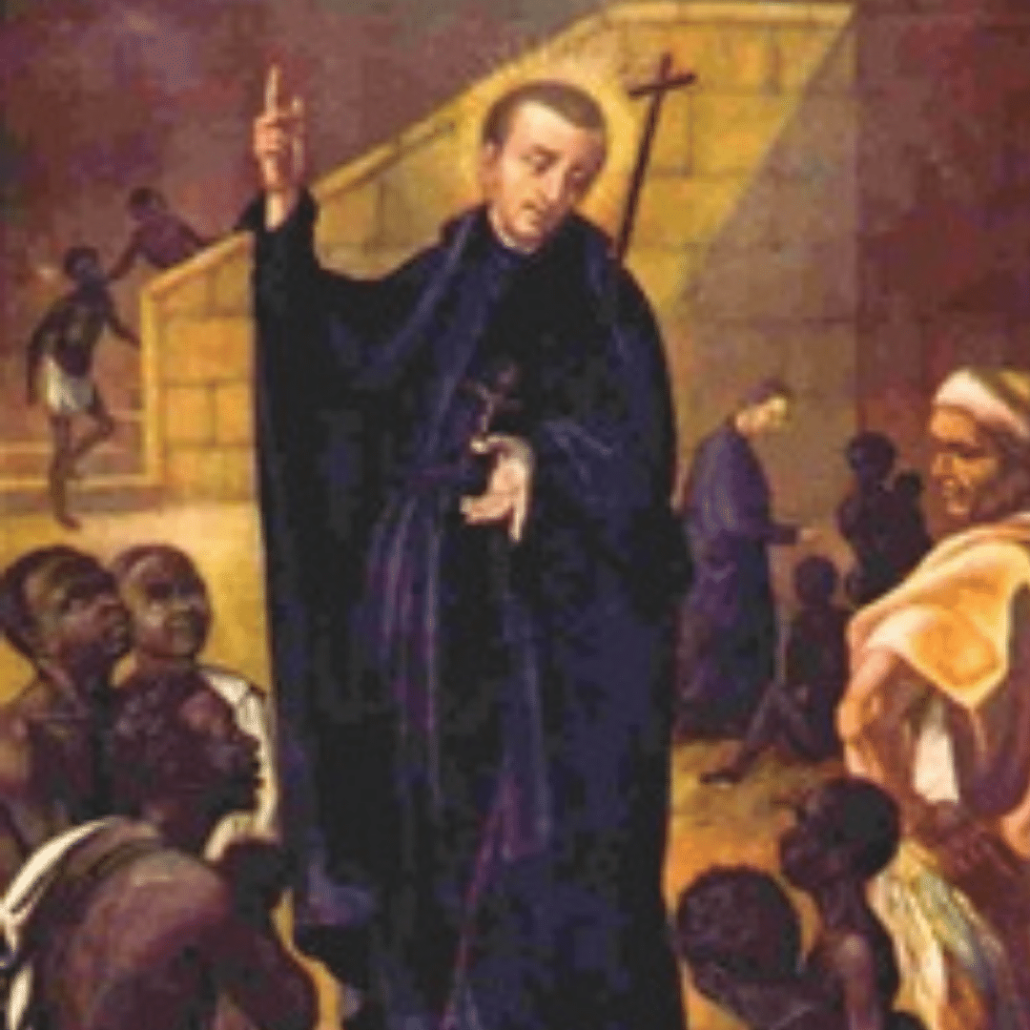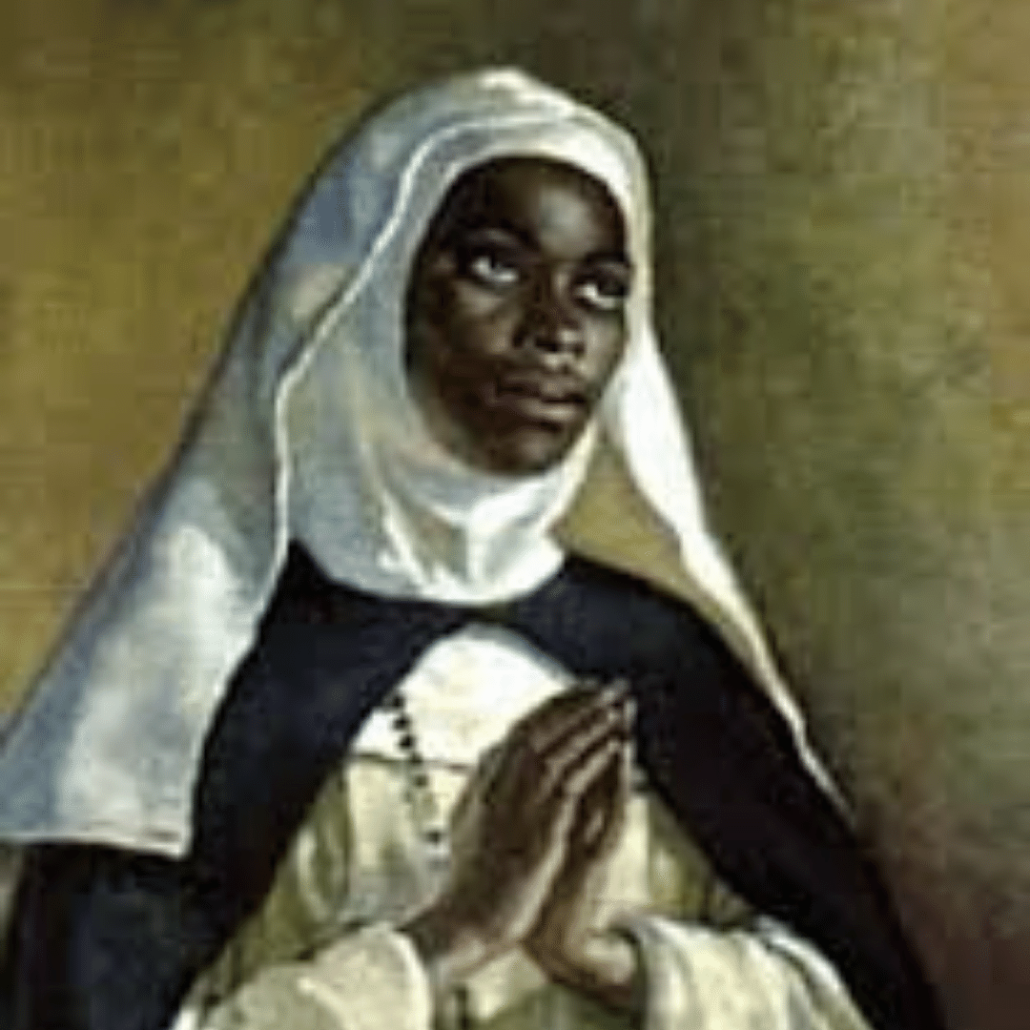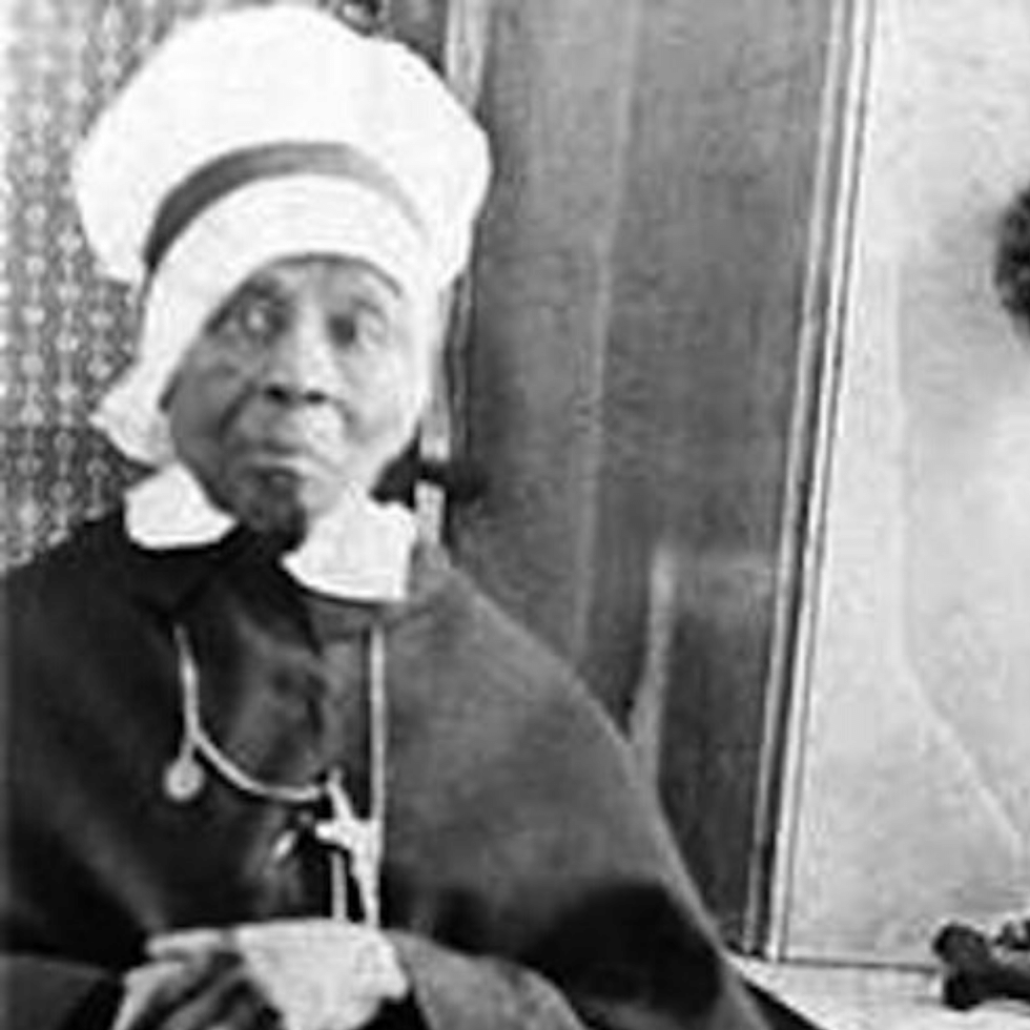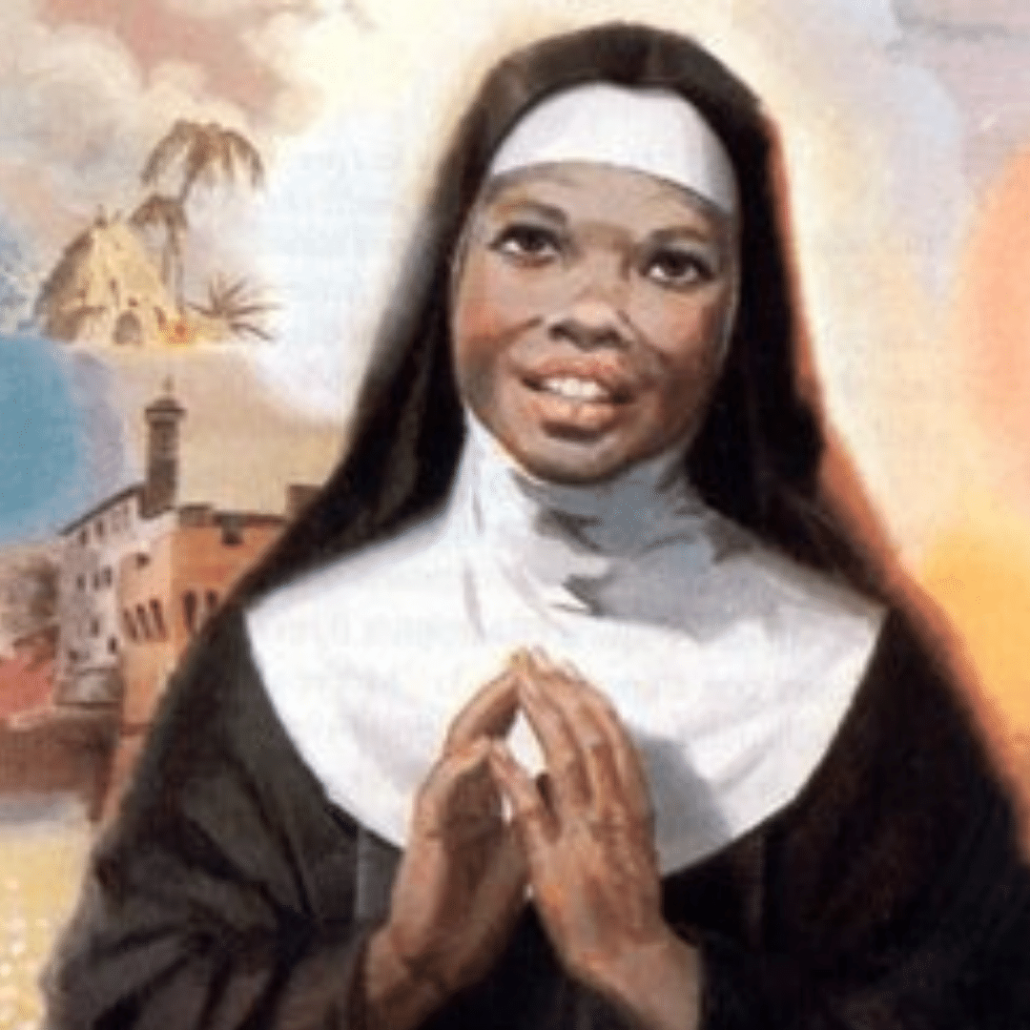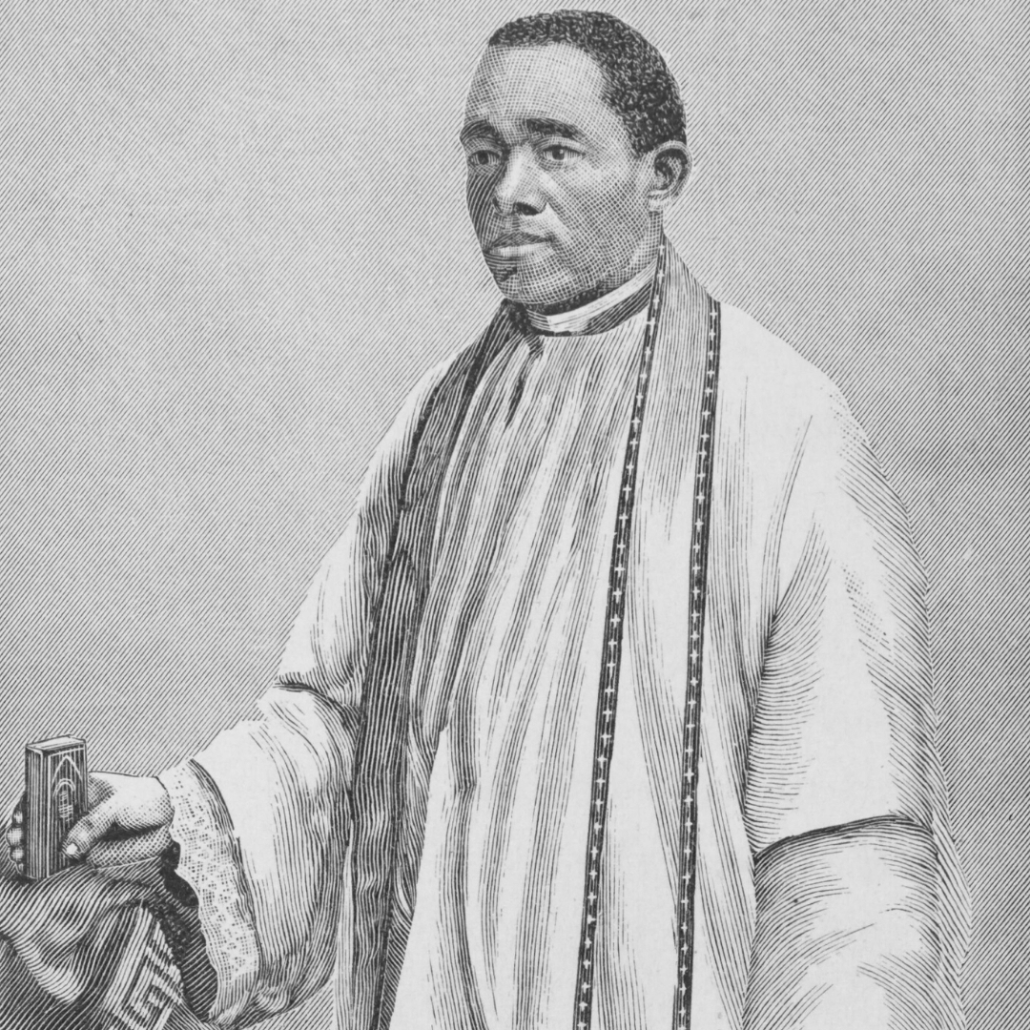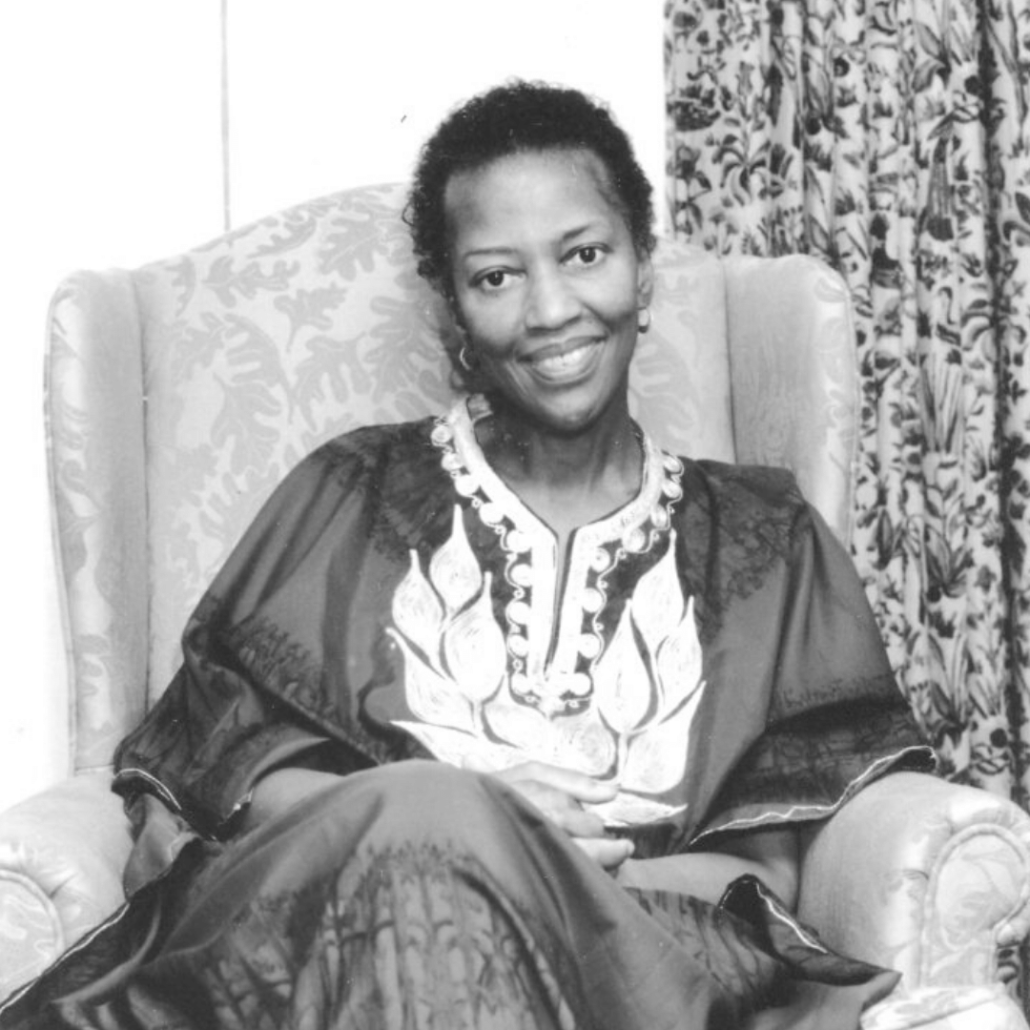In the Catholic tradition, a Novena is an ancient prayer tradition, consisting of prayer for a specific intention over the course of nine days.
Through this Novena for Racial Justice, the Jesuit and broader Catholic network is invited to unite in prayer for nine days, framed in the example of Catholic saints and servants of God who provide a witness and example for us in our work for racial justice.
Why saints?
Catholic tradition also includes the concept of “the communion of saints”—meaning the community of holy people, both living and dead, who we often call upon to intercede, or pray, for us in our times of need. We call on this tradition in this Novena for Racial Justice, asking for the prayers of saints and servants of God who have died to help us obtain the graces needed to persevere in our own internal and external work for racial justice.
Receive 9 Daily Novena Emails
You can participate in the Novena via a daily email by registering here. You can also participate via the website below.
Day 1
We begin our Novena, 9 days of prayer for racial justice, by asking for the grace to be able to share in God’s vision for a world in which the dignity of all people is upheld, and for the strength to do the work to move closer to that vision.
Good and gracious God, who loved us into creation, thank you for the gift of life and community. Thank you for the gift of the ability to recognize injustice and for the desire to work for racial justice, so that all people may equally share in that gift of life. Take, Lord, and receive all my liberty, my memory, my understanding, and my entire will. Show me the parts of my heart, mind, and soul that You desire for me to transform or strengthen to better love Your people.
Saint Ignatius of Loyola, intercede and obtain for us from God the grace of discerning ways that we are called to change our hearts, minds, and souls in order to build a more just world.
Saint Ignatius of Loyola, Pray for us.
St. Katharine Drexel, Pray for us.
St. Martin de Porres, Pray for us.
St. Peter Claver, S.J., Pray for us.
Venerable Teresa Chikaba, Pray for us.
Venerable Mother Mary Lange, Pray for us.
Venerable Zeinab Alif (Maria Giuseppina Benvenuti), Pray for us.
Venerable Augustus Tolton, Pray for us.
Servant of God, Thea Bowman, Pray for us.
Pray for us holy men and women, that we might be made worthy of the promises of Christ.
In the name of the Father, and of the Son, and of the Holy Spirit. Amen.
About
Saint Ignatius of Loyola
St. Ignatius came from a family of minor nobility in Spain’s northern Basque region. He was vain, with dreams of personal honor and fame. All that began to change one day in the spring of 1521. Ignatius was 30 years old at the time, an officer in the Spanish army. Leading his fellow soldiers into a battle against the French that they were sure to lose, he was struck by a cannonball in the leg. During a difficult recovery (he limped for the rest of his life), Ignatius found and read a book about the life of Christ and biographies of the saints — which he found unexpectedly riveting. St. Ignatius had always dreamed of imitating heroic deeds, but now, the heroes had names like Francis of Assisi and Catherine of Siena. Ignatius also noticed something strange happening to him. God, he realized, was working within him — prompting, guiding, inviting. As he traveled far and wide, he realized too that God was similarly at work in the lives of all people, in the everyday events of the world.
These experiences would prove to be the beginnings of Ignatian spirituality — and Jesuit ministry. While in Paris, Ignatius gathered around him some friends or “companions,” as they became known. Together they made religious vows in 1534 and came to call themselves the Compañia de Jesús — the Society of Jesus. Six years later, the order was granted official approval by the pope. The early Jesuits fanned out to the metropolises of Europe and beyond. They did so with instructions from Ignatius, their leader in Rome, to “seek the greater glory of God” and the good of all humanity. They devoted themselves to the care of souls, to helping people discern God’s presence in their lives. Ignatius Loyola wanted his Jesuits and everyone to go out and “find God in all things.” He died in 1556 — on July 31, his feast day in the Catholic Church.
Day 2
St. Katharine Drexel is the Catholic patron saint of racial justice. We ask today for the strength to move past what is comfortable to take bold risks and transform our lives for racial justice, as she embodied in her own life.
Gentle and loving God, we thank you for the examples of holy men and women who tirelessly work for justice. St. Katharine Drexel, patron saint of racial justice, tells us, “(Jesus) loved every human being as the image of God.” May you enable us to follow her example in boldly loving every human as an image of you.
St. Katharine Drexel, intercede and obtain for us from God the grace of leaving behind what is comfortable for what is just, to liberate all of God’s people from the sin of white supremacy and anti-Blackness.
Saint Ignatius of Loyola, Pray for us.
St. Katharine Drexel, Pray for us.
St. Martin de Porres, Pray for us.
St. Peter Claver, S.J., Pray for us.
Venerable Teresa Chikaba, Pray for us.
Venerable Mother Mary Lange, Pray for us.
Venerable Zeinab Alif (Maria Giuseppina Benvenuti), Pray for us.
Venerable Augustus Tolton, Pray for us.
Servant of God, Thea Bowman, Pray for us.
Pray for us holy men and women, that we might be made worthy of the promises of Christ.
In the name of the Father, and of the Son, and of the Holy Spirit. Amen.
About
Saint Katherine Drexel
Saint Katharine Drexel was born in Philadelphia, Pennsylvania, on November 26, 1858, to a wealthy family. However, having traveled throughout the United States, she was aware of the difficult circumstances faced by Native Americans and African Americans across the country.
In 1889, Drexel entered religious life as a novice under the training of the Sisters of Mercy in Pittsburgh, Pennsylvania. With the help of a few other nuns, she founded the Sisters of the Blessed Sacrament for Indians and Colored People (later known simply as the Sisters of the Blessed Sacrament). The order would use Drexel’s fortune to fund its work, which focused on opening and running schools for Native American children in the Southwest and African American children in the Southeast. Drexel founded a secondary school for African Americans in New Orleans, Louisiana, in 1915. Ten years later, the institution became Xavier University.
Drexel’s order had more than 500 members at the time of her death in 1935. With her assistance, the Sisters of the Blessed Sacrament had opened 145 missions, 49 elementary schools and 12 high schools. Today, the order continues its missionary and educational work.
Day 3
St. Martin de Porres is the Catholic patron saint of race relations and social justice. Following his example, we ask today for our eyes to be opened to the realities of systemic and cyclical racism and poverty in our society.
Amiable and admirable God, thank you for the example of Saint Martin de Porres’ deep commitment to social justice. May you inflame in our hearts the same love as to share our gifts and talents in charity and solidarity for those most in need today—particularly in service to the work toward racial justice. Help us to be generous with our kindness and companionship in that work.
St. Martin de Porres, intercede and obtain for us from God the grace of standing with those who suffer due to systemic or cyclical racism and poverty, as you did throughout your life.
Saint Ignatius of Loyola, Pray for us.
St. Katharine Drexel, Pray for us.
St. Martin de Porres, Pray for us.
St. Peter Claver, S.J., Pray for us.
Venerable Teresa Chikaba, Pray for us.
Venerable Mother Mary Lange, Pray for us.
Venerable Zeinab Alif (Maria Giuseppina Benvenuti), Pray for us.
Venerable Augustus Tolton, Pray for us.
Servant of God, Thea Bowman, Pray for us.
Pray for us holy men and women, that we might be made worthy of the promises of Christ.
In the name of the Father, and of the Son, and of the Holy Spirit. Amen.
About
Saint Martin de Porres
Saint Martin de Porres was the son of a freed woman of Panama, and a Spanish nobleman from Lima, Peru. After the birth of a sister, the father abandoned the family, and Martin was left in poverty. When he was 12, his mother apprenticed him to a barber-surgeon. Martin learned how to cut hair and also how to draw blood—a standard medical treatment then—care for wounds, and prepare and administer medicines.
Martin later became a lay Dominican brother, and he continued to nurse the sick and care for the poor. He treated all people regardless of their color, race, or status. He was instrumental in founding an orphanage, took care of enslaved people brought from Africa, and managed the daily alms of the priory with practicality, as well as generosity. Martin also became a formidable fundraiser, obtaining thousands of dollars for dowries for poor girls so that they could marry or enter a convent.
He is the patron saint of African Americans, Barbers, Hairdressers, Race Relations, Radio, and Social Justice.
Day 4
St. Peter Claver is the patron saint of racial justice. He dedicated his life to serving in the Caribbean those victimized by slave trade. We ask for the grace to follow his example by prioritizing the most abused and neglected in our work for justice.
Most powerful and merciful God, thank you for the ministry of St. Peter Claver, S.J. in service to those victimized by slavery. In a similar fashion, may we jump at opportunities to support and care for those experiencing vulnerability, marginalization, trauma, oppression, and exhaustion from present-day unjust systems.
St. Peter Claver, S.J., intercede and obtain for us the grace of seeing the true dignity of all people and moving our hearts towards compassion for others—both in acts of charity, meeting immediate needs, and justice, challenging and transforming systems that are at the root of injustice and oppression.
Saint Ignatius of Loyola, Pray for us.
St. Katharine Drexel, Pray for us.
St. Martin de Porres, Pray for us.
St. Peter Claver, S.J., Pray for us.
Venerable Teresa Chikaba, Pray for us.
Venerable Mother Mary Lange, Pray for us.
Venerable Zeinab Alif (Maria Giuseppina Benvenuti), Pray for us.
Venerable Augustus Tolton, Pray for us.
Servant of God, Thea Bowman, Pray for us.
Pray for us holy men and women, that we might be made worthy of the promises of Christ.
In the name of the Father, and of the Son, and of the Holy Spirit. Amen.
About
Saint Peter Claver
A native of Spain, young Jesuit Peter Claver left his homeland forever in 1610 to be a missionary in the colonies of the New World. He sailed into Cartagena, a rich port city and chief center for the slave trade. He was ordained there in 1615. Although the practice of slave-trading was condemned by Pope Paul III and later labeled “supreme villainy” by Pope Pius IX, it continued to flourish.
As soon as a slave ship entered the port, Peter Claver moved into its infested hold to minister to the ill-treated and exhausted passengers. Claver brought them medicines, food, bread, brandy, lemons, and tobacco. With the help of interpreters he gave basic instructions and assured his brothers and sisters of their human dignity and God’s love. Fr. Claver’s apostolate extended beyond his care for enslaved people. He became a moral force, indeed, the apostle of Cartagena. He preached in the city square, gave missions to sailors and traders as well as country missions, during which he avoided, when possible, the hospitality of the planters and owners and lodged in the slave quarters instead.
After four years of sickness, Claver died on September 8, 1654.
Day 5
Venerable Teresa Chikaba was kidnapped and enslaved in Spain. After gaining her freedom, she became a Dominican sister, despite facing ongoing racism from Catholic leaders. May we have the strength to call out the sin of racism in the Catholic Church.
Generous and faithful God, thank you for the example of perseverance we see in Venerable Teresa Chikaba. May we imitate her commitment to our faith in calling out the grave sin of racism in the Catholic Church, and in any institution that presently and historically has benefited from the oppression of Black people. May we show perseverance as she did in our work to build a Church and a society that casts off the sin of racism.
Venerable Teresa Chikaba, intercede and obtain for us from God the grace of perseverance in the face of oppression and white supremacy.
Saint Ignatius of Loyola, Pray for us.
St. Katharine Drexel, Pray for us.
St. Martin de Porres, Pray for us.
St. Peter Claver, S.J., Pray for us.
Venerable Teresa Chikaba, Pray for us.
Venerable Mother Mary Lange, Pray for us.
Venerable Zeinab Alif (Maria Giuseppina Benvenuti), Pray for us.
Venerable Augustus Tolton, Pray for us.
Servant of God, Thea Bowman, Pray for us.
Pray for us holy men and women, that we might be made worthy of the promises of Christ.
In the name of the Father, and of the Son, and of the Holy Spirit. Amen.
About
Venerable Teresa Chikaba
Venerable Teresa Chikaba was a Guinean princess who was kidnapped by Spanish sailors and sold into slavery. In the 1700`s she attempted to enter a convent but was refused due to her race. Finally, the convent of the Dominican Sisters of the Third Order of Saint Mary Magdalene accepted her. However, the bishop would only allow her to be a maid in the convent. Finally, after several years and now with the bishop’s blessing, she was accepted as a fully professed Dominican Sister. Teresa died on December 6, 1748. She was known for the care she gave to the poor, sick and down-hearted. Her acts of charity, her mystical experiences, and her fame as a healer or miracle worker moved her order soon after her death to commission two portraits of her for purposes of local veneration.
Day 6
Servant of God Mary Lange was the foundress of the Oblate Sisters of Providence, the first U.S.-based religious order for Black women, providing empowerment and education for Black women and children. May we, like her, be steadfast in our work for racial equity.
Righteous and gracious God, we thank you for the example of Servant of God Mary Lange whose leadership and courage provided empowerment and education for Black women and children. May the Holy Spirit guide our gifts, talents, and humility to follow in her footsteps, providing new opportunities for advocacy, inclusion, equity, and Black-centered spaces, especially in the Catholic Church.
Servant of God Mary Lange, intercede and obtain for us from God the grace of moving from compassion to action.
Saint Ignatius of Loyola, Pray for us.
St. Katharine Drexel, Pray for us.
St. Martin de Porres, Pray for us.
St. Peter Claver, S.J., Pray for us.
Venerable Teresa Chikaba, Pray for us.
Venerable Mother Mary Lange, Pray for us.
Venerable Zeinab Alif (Maria Giuseppina Benvenuti), Pray for us.
Venerable Augustus Tolton, Pray for us.
Servant of God, Thea Bowman, Pray for us.
Pray for us holy men and women, that we might be made worthy of the promises of Christ.
In the name of the Father, and of the Son, and of the Holy Spirit. Amen.
About
Venerable Mary Lange
Elizabeth Clarisse Lange’s parents were refugees who fled to Cuba from the revolution taking place in their native Saint Domingue. In the early 1800s young Elizabeth left Santiago, Cuba to seek peace and security in the United States. She settled in Baltimore, Maryland, where a great influx of French-speaking Catholic Saint Domingue refugees was settling. There, she used her own money and home to educate refugee children. In 1829, she founded the order of the Oblate Sisters of Providence, a society of African-American religious, as there were no other options for African American women to become Catholic sisters. They vowed to dedicate themselves to educating both Catholic and non-Catholic African American children. They also ministered to orphans, cholera patients, and the elderly.
By 1860, all of the Catholic schools for “colored” children in Baltimore were taught by Oblate Sisters: St. Frances Academy, St. Joseph’s School for Boys and St. Michael’s. During the 20th century, Oblate schools were founded in 15 states in the United States. They have given witness during periods of social struggle by active participation for almost 200 years of continual service to schools, day care centers, outreach and catechetical programs which encompass all age levels. They provide social and pastoral services to all ethnic groups.
Day 7
Venerable Zeinab Alif was kidnapped and enslaved in Italy, and then ransomed and entrusted to a convent. She later became a religious sister, despite oppression during an anti-Catholic phase in Italy. May we similarly work for justice, even in the face of oppression.
Kind and pursuing God, we thank you for the gift of Venerable Zeinab Alif, who as a child was kidnapped in Sudan and then enslaved. Fr. Nicolo Olivieri brought her to freedom in Italy, where she continued to experience oppression and racism. She took secret religious vows due to anti-Catholic sentiments in Italy.
Venerable Zeinab Alif, intercede and obtain for us from God the graces and favors we ask through your intercession. May we be granted the grace to tirelessly work for racial justice, even and especially in the face of anti-Blackness and white supremacy, as you fearlessly pursued your own vocation in the face of oppression.
Saint Ignatius of Loyola, Pray for us.
St. Katharine Drexel, Pray for us.
St. Martin de Porres, Pray for us.
St. Peter Claver, S.J., Pray for us.
Venerable Teresa Chikaba, Pray for us.
Venerable Mother Mary Lange, Pray for us.
Venerable Zeinab Alif (Maria Giuseppina Benvenuti), Pray for us.
Venerable Augustus Tolton, Pray for us.
Servant of God, Thea Bowman, Pray for us.
Pray for us holy men and women, that we might be made worthy of the promises of Christ.
In the name of the Father, and of the Son, and of the Holy Spirit. Amen.
About
Venerable Zeinab Alif
Ven. Zeinab Alif (Sr. Maria Giuseppina Benvenuti) was born around 1845 in Sudan. Kidnapped by slave traders as a child, she was eventually ransomed by Servant of God Nicolas Olivieri (who had founded an order for the purpose of saving Africans from slavery). He took her and the other girls he had rescued on that trip to meet the Holy Father, after which they were entrusted to a convent of Poor Clare nuns. She was baptized shortly thereafter, around the age of ten, and remained in the monastery to continue her education, particularly developing her skill as an organist. Gradually, she discovered that she had a religious vocation, but the Kingdom of Italy was in an anti-Catholic period, during which it was illegal for religious communities to accept new vocations. Zeinab waited patiently until the bishop allowed her to make secret vows in 1876, after which she wore her habit underneath civilian clothes. She was eventually able to live her vocation openly, ultimately being elected Abbess. Just before she died at 80, she promised to send a sign when she entered heaven. The day after she died, the convent bell began ringing without anyone touching it and the Sisters rejoiced that Mother Maria Giuseppina had gone home to Jesus.
Day 8
Venerable Augustus Tolton escaped from slavery and became the first Black priest in the U.S. He dedicated his life to serving in Black Catholic parishes. May we be granted the grace to commit ourselves to our own local communities in our work for racial justice.
Almighty God, we thank you for the gift of Venerable Augustus Tolton, who escaped from slavery and became the first Black priest in the United States. May we be inspired by his confidence in fulfilling the pastoral and ministerial work of God’s kingdom in Black Catholic parishes, despite frequently facing pervasive racism in the Catholic Church.
Venerable Augustus Tolton, intercede and obtain for us from God the grace of continued confidence in fulfilling the will of God, and the grace of commitment to working diligently for racial equity in our own local parishes, schools, and communities.
Saint Ignatius of Loyola, Pray for us.
St. Katharine Drexel, Pray for us.
St. Martin de Porres, Pray for us.
St. Peter Claver, S.J., Pray for us.
Venerable Teresa Chikaba, Pray for us.
Venerable Mother Mary Lange, Pray for us.
Venerable Zeinab Alif (Maria Giuseppina Benvenuti), Pray for us.
Venerable Augustus Tolton, Pray for us.
Servant of God, Thea Bowman, Pray for us.
Pray for us holy men and women, that we might be made worthy of the promises of Christ.
In the name of the Father, and of the Son, and of the Holy Spirit. Amen.
About
Venerable Augustus Tolton
Augustus John Tolton, sometimes referred to as Augustine, was born on April 11, 1854 to Martha Jane Chisley and Peter Paul Tolton, who were both enslaved on neighboring farms near Brush Creek in Missouri. Both parents were raised and baptized as Catholics, according to the stipulations of their owners. After the outbreak of the Civil War, Peter enlisted in the Union Army and died in a St. Louis hospital. When Augustus was nine, Martha escaped out of slavery, and the family crossed the Mississippi River into Quincy, Illinois.
After being tutored privately by local priests when Catholic colleges wouldn’t admit him, in 1878, he entered the Franciscans at Saint Francis College, now known as Quincy University, and helped found Saint Joseph School for Black children. The school was successful, despite opposition from white residents. After ordination he was assigned to his home diocese as pastor of the Negro Church of Saint Joseph in Quincy. Under Tolton’s leadership, the church grew to capacity and included white parishioners. This angered a Quincy clergy leader, who urged Tolton to minister only to Black members or leave.
In 1889 Tolton requested reassignment to Chicago, accompanied by his mother, sister and 19 of his Quincy parishioners. In Chicago, Tolton became pastor of an all-Black parish of 30 that had been meeting in temporary facilities. Tolton renamed it Saint Monica’s Chapel, opening initially as a storefront church. It grew to serve 600 black and white parishioners.
Fr. Augustus Tolton died on July 9, 1897 at the age of 43.
Day 9
Sr. Thea Bowman dedicated her life to dismantling racial and cultural barriers that lead to oppression, suspicion, hatred, and division through song, preaching, prayer, and storytelling. May we similarly use our gifts and creativity in our work for racial justice.
Beautiful and magnificent God, we thank you for the gift of Sister Thea Bowman. Her work to dismantle racial and cultural barriers shows us how to work to seek equity, peace, and reconciliation during times of ignorance and intolerance.
Servant of God, Thea Bowman, intercede and obtain for us from God the graces and favors we ask through your intercession, especially the grace of both breaking down barriers in our Church and society and of using our gifts, talents, and creativity in doing so.
Saint Ignatius of Loyola, Pray for us.
St. Katharine Drexel, Pray for us.
St. Martin de Porres, Pray for us.
St. Peter Claver, S.J., Pray for us.
Venerable Teresa Chikaba, Pray for us.
Venerable Mother Mary Lange, Pray for us.
Venerable Zeinab Alif (Maria Giuseppina Benvenuti), Pray for us.
Venerable Augustus Tolton, Pray for us.
Servant of God, Thea Bowman, Pray for us.
Pray for us holy men and women, that we might be made worthy of the promises of Christ.
In the name of the Father, and of the Son, and of the Holy Spirit. Amen.
About
Servant of God
Thea Bowman
Thea Bowman was born in 1937, in Canton, Mississippi. As a child she converted to Catholicism through the inspiration of the Franciscan Sisters of Perpetual Adoration, and the Missionary Servants of the Most Holy Trinity, who were her teachers and pastors. These religious communities nurtured her faith and greatly influenced her religious vocation. She additionally learned from family members, and those in her community, about coping mechanisms and survival skills, that proved essential as she navigated through the horrid experiences of blatant racism, segregation, inequality, and the struggle for Civil Rights in her native Mississippi. At an early age, Thea was exposed to the richness of her African-American culture and spirituality, most especially the history, stories, songs, prayers, customs and traditions.
In the 1960s, The United States was confronted by the quest for justice and racial equality for all Americans. This led to a transformation for Sister Thea Bowman, both spiritually and culturally. The liturgical renewal of the Second Vatican Council encouraged Sister Thea to rediscover her African-American religious heritage and spirituality. She emphasized that cultural awareness had, as a prerequisite, intentional mutuality. She was eager to learn from other cultures, but also wanted to share the abundance of her African-American culture and spirituality. Sister Thea became a highly acclaimed evangelizer, teacher, writer, and singer sharing the joy of the Gospel and her rich cultural heritage throughout the nation.

